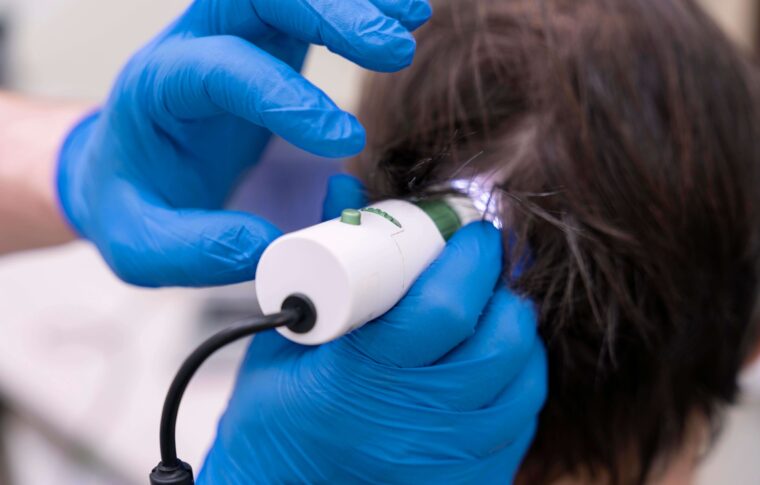Stress can indeed be a contributing factor to hair loss in certain individuals. The type of hair loss associated with stress is known as “telogen effluvium.” Here’s how stress can lead to hair loss:
Telogen Effluvium: Telogen effluvium occurs when there is a significant shock or stress to the body, causing a large number of hair follicles to enter the resting phase (telogen) prematurely. This leads to increased hair shedding, often noticeable a few months after the stressful event. The hair loss is usually temporary, and the hair typically regrows once the underlying cause (stress) is addressed.
Hormonal Changes: Stress can lead to the release of stress hormones like cortisol, which, when chronically elevated, can disrupt the normal hormonal balance in the body. Hormonal imbalances can contribute to hair loss.
Impaired Nutrient Absorption: Chronic stress can affect the digestive system and reduce the body’s ability to absorb essential nutrients necessary for healthy hair growth.
Trichotillomania: In some cases, stress can trigger a condition called trichotillomania, which is a hair-pulling disorder. Individuals with this condition compulsively pull out their hair, leading to noticeable hair loss.
Alopecia Areata: Stress is not considered a direct cause of alopecia areata, an autoimmune condition that leads to patchy hair loss. However, stress may exacerbate the condition in some people who are already predisposed to it.
It’s important to note that not everyone will experience hair loss due to stress, and individual responses to stress can vary. Additionally, other factors such as genetics, hormonal imbalances, nutritional deficiencies, and underlying medical conditions can also contribute to hair loss.
If you are experiencing hair loss and suspect that stress may be a contributing factor, it’s essential to manage stress through various means, including relaxation techniques, regular exercise, sufficient sleep, and seeking support from friends, family, or a mental health professional. Additionally, consulting a dermatologist or healthcare provider can help determine the underlying cause of hair loss and provide appropriate recommendations for treatment and management.




2 Comments
Philip James
In vel quia pede felis odio magna, volutpat massa nibh dignissim vehicula, nunc etiam ipsum, mauris malesuada velit augue fringilla metus. Tortor diam, sollicitudin enim dapibus mattis tellus nunc. Nunc rhoncus in ipsum in dis, justo magna tempor ut, justo arcu mattis nulla nulla vivamus magna, libero sit mauris dui placerat vivamus mauris, eros dapibus suspendisse nibh a.
Adam Brown
Risus lacus elit suscipit, consectetuer odio sit pede est, laoreet fusce bibendum ipsum. Placerat volutpat maecenas odio. Tortor in, magna massa in. Nulla sollicitudin sit nullam curabitur, sed adipiscing sodales non. Ipsum urna, vitae mi cras dui sociosqu erat.